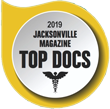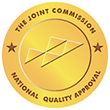Hear what Recovery Keys’ own Dr. Jeremy Mirabile had to say about the current addition epidemic on his second WBOB/600AM’s Ask the Experts show in Jacksonville, Florida on April 22nd. To hear his insights and advice on addiction, listen now! Or keep scrolling to read the full transcript of the show.
Speaker 1: With offices in Jacksonville and Saint Augustine, Recovery Keys is Northeast Florida’s leading provider of addiction treatment and rehabilitation. Recovery Keys recognizes addiction as a disease not a moral failing. Our team of board certified physicians and counselors are experts in treating individuals struggling with alcohol, drugs and pain medications begin a new life free from the ravages of addiction. Call Recovery Keys right now at 904-834-4010. That’s 904-834-4010 to speak with our addiction specialist standing by ready to help at 904-834-4010.
Speaker 2: WBOB AM 600 and FM 101.1 welcomes you to today’s Ask the Expert show with local experts in the fields of legal, financial, health and home improvement. Each week our experts offer educational information on important subjects that affect your day to day living. Now sit back and enjoy today’s Ask the Experts.
Roger: Hello and welcome to our Ask the Experts program here today and we are joined by Dr. Jeremy Mirabile. How are you doing today?
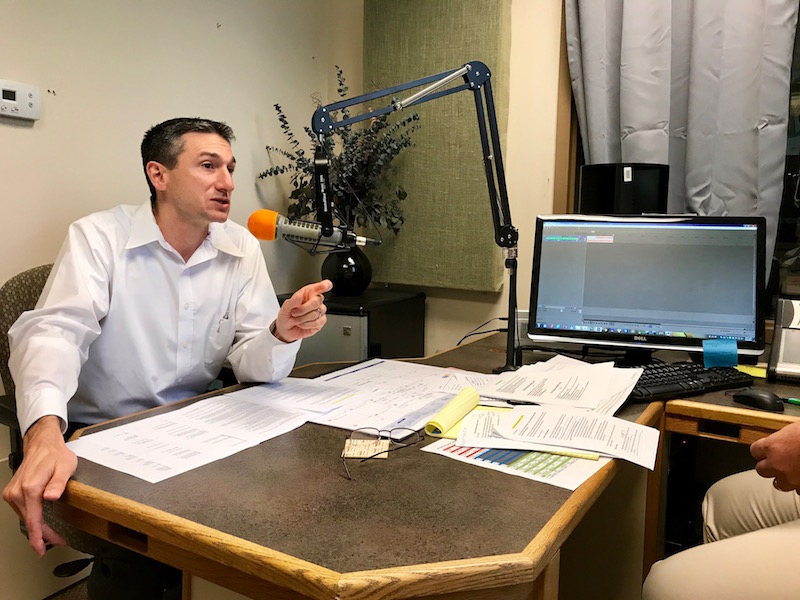 Dr. Mirabile: Very good Roger. Thanks for having me.
Dr. Mirabile: Very good Roger. Thanks for having me.
Roger: Well, we’re happy that you’re here talking about something very important to the community. You operate a clinic here in our area that helps people who are suffering from addiction.
Dr. Mirabile: That’s correct. Recovery Keys.
Roger: Okay. Tell us a little bit about what your clinic offers.
Dr. Mirabile: Sure, you know basically on the front end we do comprehensive evaluations for folks who have drug or alcohol use disorders and for those family members who are concerned that a loved one or someone may have a problem in that regard. After we do a comprehensive medical assessment we then recommend an appropriate level of care for treatment to put the disease into remission.
Roger: Okay. That’s good stuff to know. I have come through a mental evolution as it were in understanding addiction myself. There was a time in my life, I confess, I used to think that it was a character problem. That people who became drug addicts, they just had some problems with life and weren’t making proper choices.
My eyes were opened because when it comes to a physical issue, such as anything from catching a cold to getting cancer, getting sick is a factor in our bodies of the human conditions but we don’t tend to think of the brain as a physical organ that can get sick. We were talking that very often people who are suffering from addictions, there’s actually a physical component to that’s genetic in many cases. Talk about something called co-occurring conditions and how that ties in.
Dr. Mirabile: Absolutely. Thank you Roger and that’s exactly a great characterization. That’s the organ that is affected. If we were talking about diabetes we may be saying the pancreas is the organ that’s affected. But with the disease of addiction or other co-occurring or happening together mental health conditions the organ affected is the brain. When we dig into well, which condition is it? Is it anxiety, depression or is it a substance use disorder, we may need to look at various locations of the brain.
We know that the disease of addiction affects an area of the brain called the midbrain. That’s in the reward center. We know that other diseases such as anxiety and depression may occur outside of that location. We may have actually two conditions going on simultaneously. One before the other or one after the other.
Roger: Would you say it’s accurate that someone who may suffer from the physical mental condition of having depression, which the doctor’s tell us, that’s something that’s in their brain that just makes them unhappy a lot end up turning to substance abuse to self-medicate the depression and end up becoming addicted?
Dr. Mirabile: Absolutely. We find that very frequently that we may have another condition that seems to predate the blossoming or the addictive disorder coming to light.
Roger: Are they hard to diagnose?
Dr. Mirabile: Well, what we need to do is we need to get the chemicals, whatever the substance may be that the person is ingesting, whether it’s alcohol or drugs or even prescription drugs believe it or not, anything that goes through the reward pathway of the brain and is a chemical, prescribed or not, can be a problem. We need at least 30 days if not 60 or 90 to really wash that out and see if there is an independent mental health condition co-occurring or predating the substance abuse disorder.
Roger: A lot of military people who are living in our city and our nation’s come through come conflict recently. We think of some of our military personnel who suffer from PTSD and other issues. We find a lot of them end up in homeless situations and very often addicted. Would that qualify in the same category of what we’re talking about right now?
Dr. Mirabile: Absolutely. Having a traumatic experience can really precipitate the disease of addiction. If we think of that reward center of the brain as the, “I’m okay,” kind of like, “That’s my gas tank,” and if I’m below a certain level in my feel good chemical then I need to seek other things to make me feel okay. If I have a traumatic experience or I go to a war type situation or I just have other things happen to me that are significantly unpleasant, I can deplete those rewarding chemicals in that part of my brain and it leaves me wanting or really needing another level of fulfillment and often drugs or alcohol are right there. They’re quick. They’re fairly immediate and they actually change the way I feel.
Roger: Recoverykeys.org if you’d like to get in contact with Dr. Mirabile and learn more about what his clinic offers and the help that he can get, give to people who are suffering. It’s not just people who may have been in the military who suffer from PTSD. I was listening to another broadcast earlier today that sometimes sexual assault can lead to PTSD. What are some of the other things that can lead to people turning to alcohol and drugs to treat their depression or their trauma, the Post Traumatic Distress trauma?
Dr. Mirabile: Well, we know there is a close link between trauma and addiction and folks may have had an experience when they were younger per se whether it was in the home or with their friends or away that could have caused the change in the brain that is just enough to really allow the disease of addiction to take a foot hold and show itself.
Roger: How much time goes by for the average person to realize they have got a problem? You think about family members, loved ones, staging an intervention. Do you see that too much time has gone by and they could have been treated a long time ago and happily ever after back to a normal life?
Dr. Mirabile: Absolutely. The problem is is that drugs and alcohol in the short run actually work. They work to accomplish the initial goal, which is, “Change the way I feel. Change the way things are looking in my life. Give me potentially some energy, some escape.” But the cruel joke is that over time the feel good goes away and I can’t even use enough chemical to feel okay. I just chronically feel miserable.
Folks over time, everyone on the outside says, “Well, they’re using a substance. They must be partying all the time or feeling good all the time,” and that’s not so. The substances only serve to change the way we feel and potentially feel good for the very early stages. We’re talking days or weeks, maybe months. By the end of it years later it’s misery. But an individual doesn’t know quite how to get out of it and by that point there is so much shame and guilt with all the things I may or may not have had to do to supply my habit that I can’t ask for help.
Roger: Yeah. There’s a whole issue of denial as well. Sometimes people think they can handle it. In fact, I’ve got a friend who is a minister believe it or not and he used recreational drugs back when he was a teenager. Later on in life he had some medical treatment that ended up causing chronic pain and the doctor’s were trying to treat that and the medicine wasn’t as effective as it would have been otherwise. Don’t think they have an issue with drug or alcohol dependency. What are some of the signs that family members need to look for when they see a person who may have a problem that they need to see someone like you to get help for?
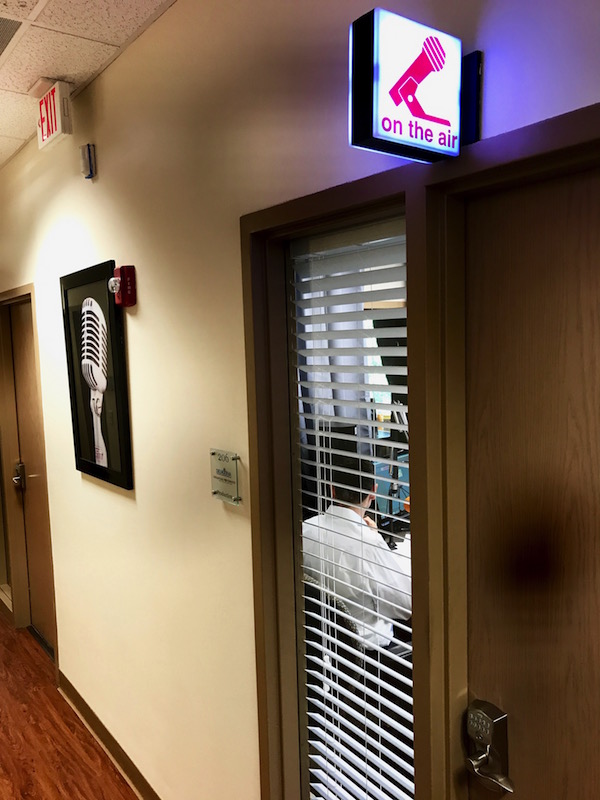 Dr. Mirabile: Well, I first want to speak to that point of denial. It’s a very good one and that is often it’s talked about that denial is the main or the first symptom of the disease of addiction. Well, that’s partially true in that it does exist but also across the spectrum with other medical conditions the level of denial exists as well.
Dr. Mirabile: Well, I first want to speak to that point of denial. It’s a very good one and that is often it’s talked about that denial is the main or the first symptom of the disease of addiction. Well, that’s partially true in that it does exist but also across the spectrum with other medical conditions the level of denial exists as well.
If we think of the person initially diagnosed with diabetes. I very rarely have seen folks who accept that at face value. Often it’s one trip to their doctors, another trip potentially to the emergency department and it may take a couple of hospitalizations for it to really cement into the person’s mind and heart that they have a biologic condition that they need to accept. That their system is a bit different and I need medications, I need an intervention, I need treatment for this medical condition and therefore it kind of goes hand in hand with substance use disorder or addiction. Whether it’s diabetes or addiction there’s this level of denial that comes with all medical diseases.
As far as signs and symptoms, you know with regard to family it’s definitely the change in behavior, the social withdrawal, the depression, change in personality and then basic knowledge and admission that the person is using a chemical. That’s really kind of a hallmark when you add it all together in the absence of other factors I have chemical use, I have a change in behavior, personality, relationships with family and friends, ability to meet my obligations at work and at home, that’s really the perfect storm for meeting criteria for having a disorder and would need a professional to dig in and have a formal evaluation.
Roger: Yeah. Most of the people you treat do have an issue with chemical dependency whether it be in liquid form, alcoholism or some type of medication they’re taking. You spoke to me privately that sometimes you treat people who don’t necessarily have a chemical addiction but they’re addicted in some other way to something that’s not healthy for their family or for themselves.
Dr. Mirabile: Absolutely. We’ve had some recent studies that were done out of Las Vegas of all places that really showed that things like gambling can manifest itself in physical systems of irritability, withdrawal, sweating, craving, when I’m taken away from my process of choice. In this case it may be gambling that creates the high for me. It’s not a powder or a liquid at all, it’s a process. That can go over into other things whether it’s internet, whether it’s shopping, potentially eating or even workaholicism.
Roger: I think of sexual addiction as well.
Dr. Mirabile: Yes.
Roger: That can be very devastating to a family.
Dr. Mirabile: Yes, that’s part of the reward pathway of the brain, food, water and sex often goes through the same pathway of the brain and then when something more reinforcing comes in, it actually pushes out some of the less rewarding behaviors and the new ones become paramount to what the brain thinks as survival. It’s not survival at all but the individual living with the experience believes that they need that chemical or that process in order to survive. When somebody comes in and tries to take that away from them, their reaction is, expectedly so, fairly resistant, defended and uses other things to push people away.
Roger: Dr. Mirabile is with us today and we’re talking about addiction. He operates a clinic here in our area. Where are you located by the way?
Dr. Mirabile: In Jacksonville, in Bartram Park area, and also in Saint Augustine over the 312 Bridge.
Roger: Okay, Helping a lot of people in our area deal with addictions whether it be alcoholism, whether it be drug abuse, whether it be some other area of addiction that’s not healthy. He is here to offer help and you can learn more about his practice at recoverykeys.O-R-G, recoverykeys.org and really wants to see you on a path to recovery. Talk about real quickly the difference between one rehab program and another.
Dr. Mirabile: Well, as long as someone gets help, get help somewhere but if we have to drill down into what makes the components most effective, we find that the multi-disciplinary approach, which means that I have professionals in different disciplines who are coming to bear on my medical problem. That might mean a psychotherapist, someone certified in therapy, someone who is able to relate regrading counseling, personal recovery, 12 step type addiction related counseling, a psychologist is also useful potentially to do some more testing in domains of my brain that may be affected.
Maybe my memory is not the same. Maybe I have a safety sensitive position and I need to know what has the disease done that’s affected my ability to practice my profession of choice? Another member of the multi-disciplinary team would be the physician who does a comprehensive medical evaluation and assessment and really gets the comprehensive picture. A family therapist is potentially another member of the team who specializes in what the disease has done to my family. We often speak of it as a family disease. Even though one person is suffering with it all of those who are close to them potentially suffer the effects as well.
Roger: Because this is a medical treatment issue federal law guarantees confidentiality. What is if someone’s embarrassed? They don’t want people knowing that they need to get treatment. Talk about some of the safeguards that are in place right now and federal laws that keep people from knowing their private business with respect to this issue.
Dr. Mirabile: Absolutely. Very sensitive issue and we are sensitive to it as a treatment center. You know, when folks come in it’s a private confidential evaluation. That record is kept under lock and key double. Basically folks are familiar with HIPA, the Health Information Protection Act that most hospitals and other medical facilities follow. For mental health and addiction treatment, there’s actually another kind of statute that’s sort of above HIPA that’s called 42CFR and that has to do with federal confidentiality of mental health and substance abuse treatment and records. It’s extra protected.
Roger: That’s good to know because a lot of people maybe resistant to getting treatment because they feel they’re coming out. Then everyone’s going to know what their problem is and maybe they work in a profession where this type of thing has a stigma associated with it. It could hurt their career or whatever the case may be. Recoverykeys.org is the way you can learn more about what Dr. Mirabile is able to offer people who are suffering with addiction. Talk about some of the credentialing agencies. I’m looking at one called The Joint Commission and there may be some others.
Dr. Mirabile: Yes, The Joint Commission is one of the gold standards for addiction treatment programs. They basically come in, do a very thorough audit and it’s the external validation that really gives that gold seal of approval that this place has the multi-disciplinary staff and attention to detail that’s required to adequately treat this disease.
Other groups, you know the American Board of Addiction Medicine is a newly formed board for physicians that really gives the seal of approval for the medical doctor who is evaluating and treating the disease of addiction. One would like to see that that physician is board certified from the American Board of Addiction Medicine.
Roger: Yep. We think about addiction traditionally, especially someone who’s not been affected by it either themselves or a family member, there’s this thinking that the guy is going to a bad part of town. They’re finding a guy wearing a hoodie and he sells him something under the darkness of night and in a little plastic bag. But that’s not necessarily the case a lot of the times. People are getting in many cases legal prescriptions from their doctor to treat a legitimate issue and it just gets out of control. Talk about the issue with prescription medication and the crisis we’re seeing with opioids on our area.
Dr. Mirabile: Absolutely. That’s a common theme nowadays. In fact, it’s a prevalent as alcohol use disorder where someone has an event, such as a motor vehicle accident and they get sent to potentially their orthopedic physician and then pain management and then they get placed on prescription opioid medication such as Oxycodone, Hydrocodone and they can’t get off. And often they might have a primary care doctor who’s giving them another medication, let’s say Valium or Xanax for sleep or for anxiety and they start mixing and matching and potentially getting themselves into a physically dangerous situation. It could result in a failure to breath.
Roger: I’m thinking right now, and it’s breaking my heart right now, I’m thinking of a young lady, a little girl at church that I remember seeing when she was growing up and she became a young lady in her twenties. Apparently had some type of issue like this where she was hurt. Doctor gave her some medicine and one night she decided to take it with a glass of wine and didn’t wake up.
Dr. Mirabile: Absolutely.
Roger: That kind of thing happens.
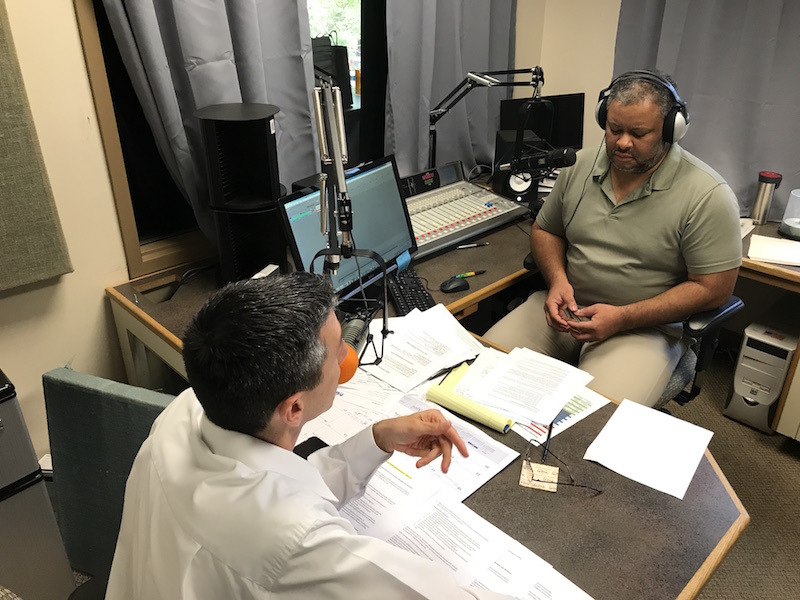 Dr. Mirabile: It’s unfortunate that one plus one equals three. There’s this synergy that we can’t quite predict medically when we start to give multiple classes of sedating medications together and the mixing and the matching. It’s kind of compounded when folks are not under the care of a physician and they think, “I’m going to do what I think is best for me. Maybe I’ll take a little more of this, a little less of that, and kind of come up with my own concoction.” It’s another level of risk.
Dr. Mirabile: It’s unfortunate that one plus one equals three. There’s this synergy that we can’t quite predict medically when we start to give multiple classes of sedating medications together and the mixing and the matching. It’s kind of compounded when folks are not under the care of a physician and they think, “I’m going to do what I think is best for me. Maybe I’ll take a little more of this, a little less of that, and kind of come up with my own concoction.” It’s another level of risk.
Roger: It’s real serious. And maybe you know someone, maybe you yourself struggles with addiction. You can get help. There is help here. Dr. Mirable would love to see you, to meet with you. You can learn more about his practice. A couple of clinics in our area, in the Mandarin area and in Saint Augustine. Recoverykeys.org. Recoverykeys.org.
Medical professionals Dr. Mirabile, have a very unique risk of being addicted. Talk about that very quickly.
Dr. Mirabile: When we look at population based studies and we say, “How many folks in America may be subject to or have the disease of addiction?” Numbers seem to indicate around 15% and we have some trouble nailing that number down because a lot is relied on self-report. There’s a lot of shame and guilt with the condition. Even 15% of three hundred million, we’re talking about a lot of folks. If we compare that to the number of folks with diabetes, it’s actually more prevalent than diabetes.
When we move that over to health professionals and other professionals, the frequency, the prevalence of this disease is about the same. They actually suffer with mental health issues as well as substance use disorder about the same rate as the general population and need treatment as well.
Roger: Again, we’re going back to our initial conversation earlier on that a lot of this is physiological. There’s a brain condition that they inherited from their parents or grandparents and great grandparents that makes them more likely to become addicted if they are exposed to it. And again, the access of someone working in the medical profession, talk about that.
Dr. Mirabile: Yeah, I mean it gets into a lot of detail. They started to ask, “Well, are certain disciplines in medicine potentially more apt to have this disease show itself?” We know there’s a genetic situation where I may be predisposed no matter where I work and what I do. But when we get into the data with health professionals it seems like the field of anesthesia has the highest rates of addiction across the board.
There’s been some research done that seems to indicate that maybe exposure to some of those chemicals, even basically breathed in the air of the operating room as somebody leans over the patient taking care of them, that can open the gateway or open the process into the disease of addiction blossoming. Combined with access to medicines and being around that sort of stuff all day.
Roger: Right. Doctors, they have to be very sensitive. Sometimes if you find that if someone’s a medical doctor and there maybe a nurse that works in his office, he may be more willing to give that nurse a prescription for something that’s a little dangerous that he wouldn’t give a typical patient thinking that that nurse has a better grasp and understanding of what the risk of the medication is?
Dr. Mirabile: Yes. The person prescribing, you know whether it’s a doctor or an ARNP or whatever, doesn’t understand the disease of addiction and really doesn’t do a good risk benefit profile, then the risk of causing a problem is higher than it needs to be. Just like any other modality that a physician would propose for a treatment, you have to be able to objectively gauge risk versus benefit. If I’m not really trained and understanding what is the potential risk in the person I’m prescribing to as in the risk of them having an underlying addictive disease or having a genetic predisposition, then am I really opening them up to more problems than good?
Roger: Okay. Before we wrap up, there’s certain professions that if someone becomes addicted it would actually threaten their ability to work. They could have their licensure revoked with various professions. Talk about that and how you can help those people.
Dr. Mirabile: Yeah, there are only certain I would say treatment centers that have the full grasp on the understanding of safety sensitive position. There are some occupations that require a certain skill set in order to go back to work and reliably perform one’s job functions. You need to have assessment evaluation and treatment by a place that’s familiar with that. That ranges from somebody working as a harbor pilot or in a nuclear power plant, high tension power to operating room, emergency department, and other fields that carry potentially risk to the public if I’m not well. We at Recovery Keys like to do a thorough, not only evaluation but job and treatment so that someone could safely return to their profession of training and choice if possible
Roger: Insurance, does that typically cover your services?
Dr. Mirabile: Yes, that’s the good news is that insurance does cover drug and alcohol treatment. For folks, depending on the policies and there’s a lot of details in that but in general it’s available. There are community resources for those who don’t have insurance. Safety net type stuff for each community and I think in Jacksonville, Gateway and River Region do a good job for us. Epic and Stuart [Marchman 00:22:09] a little bit further south of here. There’s really no excuse not get help in some form or fashion. If I do have commercial based insurance and I can go to a treatment center such as Recovery Keys that’s fantastic. If I don’t have any insurance or any resources, I can still get help at least through the community based providers.
Roger: I can hear your heart and your compassion for those who are suffering because you’re not just trying to get people to come to your service, which is Recovery Keys, but get help where they can get it. I admire that and commend you for letting that be known with those that may not have the insurance that covers it. Let’s ask one last question, the addiction problem not only affects that person but it affects their ability to provide, it affects maybe the atmosphere in the home, talk about how addiction not only affects the individual but everyone around them.
Dr. Mirabile: Yeah, we say right up front that it’s a family disease. Often some of the ones suffering the most are actually the family members. In good treatment, when an individual comes in often the best gift that they give is to the family to say, “I’m going to get help,” and they can actually sleep at night knowing that their loved one is getting treatment for their condition. That’s one of the perspectives that we provide for the patient and the family to actually take this courageous step is give it as a gift to those who are concerned for you.
The family also becomes enmeshed in the process. As that individual has become overtaken by the behaviors that drive the disease, they’ve had to either distance themselves or potentially be part of the addiction cycle and subserve the really demands of that person. It’s exhausting, it’s dangerous and it really needs to be also addressed and treated. While their loved one is in treatment we often recommend specific help for the family to get healthy again.
Roger: Okay. Thank you so much Dr. Mirabile. The time has really slipped by us but hopefully people listening right now will have a better understanding of the problem. Maybe they’re coming to realize they may need to see someone like you right now before it really gets out of control or maybe it’s out of control already. You’re easy to find online. Recoverykeys.O-R-G. Recoverykeys.org. Thank you doctor for spending time with us today.
Dr. Mirabile: Thank you for having me.
Speaker 1: With offices in Jacksonville and Saint Augustine, Recovery Keys is Northeast Florida’s leading provider of addiction treatment and rehabilitation. Recovery Keys recognizes addiction as a disease not a moral failing. Our team of board certified physicians and counselors are experts in treating individuals struggling with alcohol, drugs and pain medications begin a new life free from the ravages of addiction. Call Recovery Keys right now at 904-834-4010. That’s 904-834-4010 to speak with our addiction specialist standing by ready to help at 904-834-4010.

